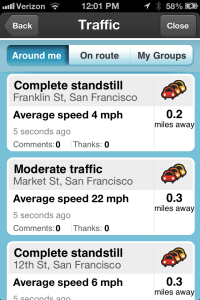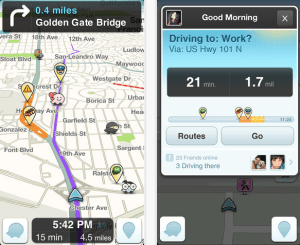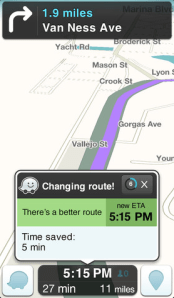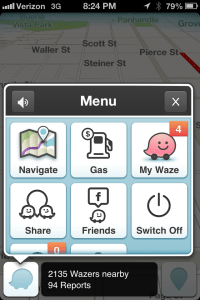 The tech industry has seen its fair share of acquisition whoppers lately, with Salesforce acquiring ExactTarget for $2.5 billion this month, and Yahoo putting the icing on its acquisition spree by snatching up Tumblr for $1.1 billion. But the news today that Google is buying popular iOS map and navigation app, Waze, (reportedly for around $1.1 to $1.3 billion) is a little different.
The tech industry has seen its fair share of acquisition whoppers lately, with Salesforce acquiring ExactTarget for $2.5 billion this month, and Yahoo putting the icing on its acquisition spree by snatching up Tumblr for $1.1 billion. But the news today that Google is buying popular iOS map and navigation app, Waze, (reportedly for around $1.1 to $1.3 billion) is a little different.
While the prices are similar and Tumblr may well have seen interest before Yahoo swooped in, rumors have been swirling around Waze for months. First it was Apple with a reported ~$500 million bid, then it was Facebook that was said to be kicking Waze’s tires at $1 billion, before Google swooped in, upped the ante and closed the deal.
In fact, Israeli publication, The Globes, reported that Facebook execs were committed enough that they flew to Israel and were in the middle of serious (albeit stalling) negotiations when Google showed up.
What’s This Waze Everyone’s Blabbin’ About?
Founded in 2007, Waze is an Israeli and Palo Alto-based developer of free mapping and turn-by-turn navigation apps for iOS and Android. Since its launch a year later, Waze has raised $67 million in outside funding from a number of prominent Silicon Valley firms (including Kleiner Perkins), as well as Horizons Ventures in Hong Kong, and has grown to 110 employees — with the majority of its staff in Israel and around 10 or so in Palo Alto, including CEO Noam Bardin.
Amidst a flood of third-party mobile mapping apps that have emerged since, Waze is today pushing 50 million users (up from 30 million in October) and has managed to find a steady growth curve thanks to its unique crowdsourcing formula. Rather than assiduously map out every single road, lane and byway, Waze relies on its millions of users to act as traffic cops, field ops and cartographers, flagging and recording updates on accidents, bottlenecks and traffic as they drive. It sucks in and aggregates this realtime user data (on speed, location, routes and so on), using it to build out and refine its own maps and to calculate the best possible routes (and re-routes) for its drivers, among other things.
This crowdsourced data, driver-sourced mapping, community curation and citizen traffic reporting adds an interactive element to the user experience, which not only quickly becomes addicting, but tends to be more accurate thanks to its obsessive (and often geeky) army of reporters relaying traffic data and updates in realtime. The crowdsourcing model also (in theory) helps make it easier for Waze to offer more accurate re-routing info when you inevitably miss that left turn at Albuquerque — something the majority of apps struggle with (even Google) thanks to the amount of stress these realtime calculations and calibrations (and processing) put on the app and its infrastructure.
In other words, it’s a tough problem to solve, and the more realtime feedback and data you have on routes, etc., the better the experience is for drivers.
So, this, along with enabling drivers to tap into social layers, view realtime fuel prices, nearby gas stations, points of interest and use hands-free navigation (all of which adjust to your location as you drive), have enabled Waze to become an attractive alternative to native navigation apps. Which is impressive, considering its native competitors came with your phone when you bought it, so they’re already there, a finger tap away. As it is with apps no matter the category, to compete, there has to be a significantly higher value proposition, otherwise you’ll just stick with what’s on your phone.
How It Attracted The Big Three
 As Jordan recently pointed out, the so-called “Map Wars” have become increasingly intense among the big mobile tech companies. For the Average Joe, while a navigation and mapping app probably won’t be the reason you buy one phone over another, a reliable, easy-to-use map app is key to a good mobile experience. After all, we use our maps and navigation apps so frequently — rely on them, really. For that reason, it’s no wonder Facebook, Apple and Google are all scrambling to one-up each other.
As Jordan recently pointed out, the so-called “Map Wars” have become increasingly intense among the big mobile tech companies. For the Average Joe, while a navigation and mapping app probably won’t be the reason you buy one phone over another, a reliable, easy-to-use map app is key to a good mobile experience. After all, we use our maps and navigation apps so frequently — rely on them, really. For that reason, it’s no wonder Facebook, Apple and Google are all scrambling to one-up each other.
For Apple in particular, when the company was rumored to be checking out Waze, it was still stinging from the embarrassing premature release of its own native mapping and navigation app, which was so bad it drew a fairly unprecedented public apology from Apple CEO Tim Cook. With Apple Maps hitting the App Store half-baked, acquiring a popular and arguably far-more-accurate navigation app would have made sense. Hopefully Apple’s decision to pass on Waze isn’t a product of the company believing it can just build a better app internally. Sure, maybe it can, but that would also just smack of the same hubris/lack of perspective that led them to think Apple Maps was good enough to be released in the first place. (You think Steve Jobs was satisfied with “good enough”? Hell no.)
As to Waze and Facebook: The Social Network has been loudly stepping up its mobile game, including the recent launch of its much-ballyhooed half-operating system for Android (or “apperating system,” if you prefer Geek Speak), which comes amidst a laundry list of other mobile updates, shifts and product releases it’s made of late. After all, mobile is becoming an increasingly important part of Facebook’s bottom line. For Facebook, being able to offer a reliable, popular mapping app as a “native” part of its Android experience might have given potential customers a reason to take a second look and put a jolt into the lackluster adoption of Facebook Home.
Google’s situation is a bit different, as it already has a world class map product. For all intents and purposes, Google Maps set the standard and Google might as well have invented consumer-facing digital navigation (All apologies to MapQuest, of course.) I mean, what other company can you name that has sent out a fleet of hilarious-looking, seeing-eye cars to map each and every street? We now take it for granted that we can pop over to Google Earth and instantaneously “fly anywhere” on the planet to “view satellite imagery, maps, terrain, 3D buildings, from galaxies in outer space to the canyons of the ocean.” Which is ridiculous.
Why Google Won Out
In a blog post today, Waze CEO Noam Bardin gave a little insight into the mutual motivations for Waze (and for Google CEO Larry Page and Google GEO VP Brian McClendon, specifically.):
“We are excited about the prospect of working with the Google Maps team to enhance our search capabilities and to join them in their ongoing efforts to build the best map of the world,” he said, before revealing that “nothing practical will change” after the acquisition, and that Waze “will maintain [its] community, brand, service and organization.”
But that doesn’t really say much, so while both companies aren’t laying out all the gory details yet, below are a few of the reasons why Google was willing to shell out the big bucks and why it should be giving Apple, Facebook and everyone else map-shaped fits.
Geography.
 Israel has a long, celebrated history when it comes to technology and R&D, and its startup economy, which is already one of the strongest in the region, continues to evolve and produce great companies. But with the exception of Cisco’s $5 billion purchase of NDS, Waze represents one of the largest exits for an Israeli-born company in recent memory. Especially consumer.
Israel has a long, celebrated history when it comes to technology and R&D, and its startup economy, which is already one of the strongest in the region, continues to evolve and produce great companies. But with the exception of Cisco’s $5 billion purchase of NDS, Waze represents one of the largest exits for an Israeli-born company in recent memory. Especially consumer.
But more importantly, Google, as with every tech company, is now well aware of Israel’s talent pool. In the past, it’s scooped up native startups like Labpixies and Quicksee, and it already has a presence in Israel, including its recently-launched program for local entrepreneurs. With most of Waze’s staff based in Israel, Google wants to maintain the current set up, as it makes Israel’s strong R&D and emergent talent pool that much more accessible.
Less About The 50M, More About The Data.
It’s not unusual for companies to make acquisitions for their users, especially if that traction and user base is significant (and its users are on the younger side). Yahoo’s acquisition of Tumblr is a perfect example. But, with Google already owning arguably the most popular navigation app in the U.S., it’s not exactly dying for more users. Though certainly 50 million users doesn’t hurt.
But likely there’s a stronger pull in the overlap of what the companies see as their perceived value. Waze doesn’t consider itself a “Mapping Company,” but a “Big Data Company.” And considering Google is out to organize the planet’s information, Google is practically the definition of Big Data (and helped invent MapReduce), even if it hates that label, as MIT Tech’s Antonio Regalado explains. What’s more, Google loves to experiment with different ways to visualize Big Data in its maps, and its new, updated Maps product keeps improving.
 And, really, the mapping game is won on Big Data, isn’t it?
And, really, the mapping game is won on Big Data, isn’t it?
Because of its giant data set, and maturing mapping infrastructure, Google itself has begun to leverage that data to offer custom, personalized maps for its users — something that’s fundamental to the social, customizable experience Waze has sought to create. But, generally speaking, when it comes to realtime navigation, adjusting to the driver’s route as it goes, Google still feels more pre-programmed. Yes, it has improved in the newest version of Google Maps, but while it has colored traffic layers to show users degrees of traffic, it doesn’t seem on par with Waze’s in-route, constantly-updated traffic info. And it often doesn’t offer the same number of potential routes as Waze when a driver is, say, looking to avoid traffic.
These differences in user experience may seem small by themselves, but compounded, they could represent a big value-add to Google Maps down the road. Plus, Google’s design has become uniform in an effort to maintain a single user experience across its various properties. Waze’s design and user experience is more fun, liter and more interactive. Wazers can be religious about reporting traffic jams or speed traps, and Google knows that it can use that.
Social Driving
Waze gives Google the perfect opportunity to leverage Google+ and make Google Maps more social. The company has moving quickly to integrate its new social graph (Google+) across its products, but it’s not there yet. Waze, too, has been stepping up its social game, adding social functionality in October that allows drivers to see which of their friends are on their way to a mutual destination, gave them the ability to share drives, pickups, meetup spots and more easily communicate status from the road.
Waze also added Facebook single sign-on, which one can easily see Google replacing with Google+ authentication to drive more users to Google+. And Google+ could use some friends, lets be honest. With its Facebook integration, Waze gave users the ability to collect friends around a shared destination point, distribute directions to that group and use short cuts — all cool features that Google can continue to expand via Google+ (as it already added social search function in its new version of Google Maps).
The Big Potential Of Local Advertising
While it’s always working to be seen as some sort of next-gen digital utility provider, Google is first and foremost an advertising company. Really, many of its services’ main function is to help their customers get their ads in front of their users. Google advertising can be a key asset to Waze going forward as it looks to expand its own revenue potential and advertising platform.
 Up until recently, Waze had put monetization on the backburner, focusing on growth and product. But, late last year, Waze rolled out its own Ad product, which is essentially a “location-guided ad platform for local business owners and big brands that want to attract the attention of nearby drivers.”
Up until recently, Waze had put monetization on the backburner, focusing on growth and product. But, late last year, Waze rolled out its own Ad product, which is essentially a “location-guided ad platform for local business owners and big brands that want to attract the attention of nearby drivers.”
While Waze previously allowed users to quickly tap and swipe through its categories to locate nearby gas stations, for example, its new ad product aims to take that to the next level. Rather than simply plastering display ads all over your phone’s already-limited surface area, Waze wanted to create a system where local businesses (and chains) can claim their spot on its maps, while sending out targeted messages and “native” ads to people who are already driving nearby and already happen to be looking for a local place to eat, for example.
Waze’s advertising product gives brands like Dunkin’ Donuts access to a self-serve advertising platform, where they can “set, change and measure their mobile advertising campaigns,” along with features like “local search advertising and advanced targeting.”
Who does that remind you of?
Many of the big tech companies have been looking to make a splash in local, whether it’s Foursquare, Yelp or Facebook, and many more are trying to get there. These three companies in particular can tap into geo-location data via check-ins and local search, but none of them can hold a candle to Google’s scale.
 Yes, Google+’s local business pages may not quite have the same adoption as Facebook Pages, but the company is working hard to shore up the gap and make G+ a destination, digital real estate that’s actually valuable to local businesses. Though it doesn’t have the traffic yet, it’s getting harder and harder to ignore Google+. The company has an enormous dataset on local businesses, listings, contact information, hours and so on and they’ve capitalized on that to cater to local advertisers looking to reach customers as they search for related keywords, etc.
Yes, Google+’s local business pages may not quite have the same adoption as Facebook Pages, but the company is working hard to shore up the gap and make G+ a destination, digital real estate that’s actually valuable to local businesses. Though it doesn’t have the traffic yet, it’s getting harder and harder to ignore Google+. The company has an enormous dataset on local businesses, listings, contact information, hours and so on and they’ve capitalized on that to cater to local advertisers looking to reach customers as they search for related keywords, etc.
Local, mobile advertising spend in the U.S. is expected to skyrocket over the next few years, making Google’s vast index of local businesses and search extremely valuable to Waze, and to an extent, vice versa. Although adding this search and its accompanying massive dataset and processing on the backend may lead to a more cluttered user experience (and its hard to imagine Google will never touch Waze’s UI), Google can also give Waze the kind of search functionality and integration that it’s still missing.
Game Over?
The more one starts to drill down into the motivations for the acquisition, it gets easier and easier to justify the one-billion-dollar price tag. And, although it’s rarely said of big-ticket acquisitions like this, it almost seems as if it’s a steal. Rather than having an excellent map and navigation product fall into the hands of one of the other big players that (desperately) needs it, Google has taken its already stellar Maps product and added a younger but potentially equally valuable one.
And while Wazers may worry about its new owner tinkering (and screwing) with the app’s current experience and interface, it’s more than likely that any significant changes or integrations are still a long ways out. Plus, as my homeskillet and colleague Greg Kumparak points out, Google can immediately start getting value out of Waze’s realtime traffic data and its on-the-go re-routing prowess — both of which Google needs and both of which can potentially be integrated into Google Maps without spoiling Waze’s user experience.
Ultimately, however, if the “Map Wars” are more than just hype drummed up by the media and if its outcome has any significant bearing on their mobile strategies, than this seems like a fairly big loss for Facebook and Apple. It almost seems as if it would’ve been worth it just to keep Waze out of Google’s hands, but again, there’s a big mobile landscape beyond Maps. Regardless, after the Waze-oogle deal, Apple, Facebook and everyone else are now swimming upstream against a stronger current.






























Comment